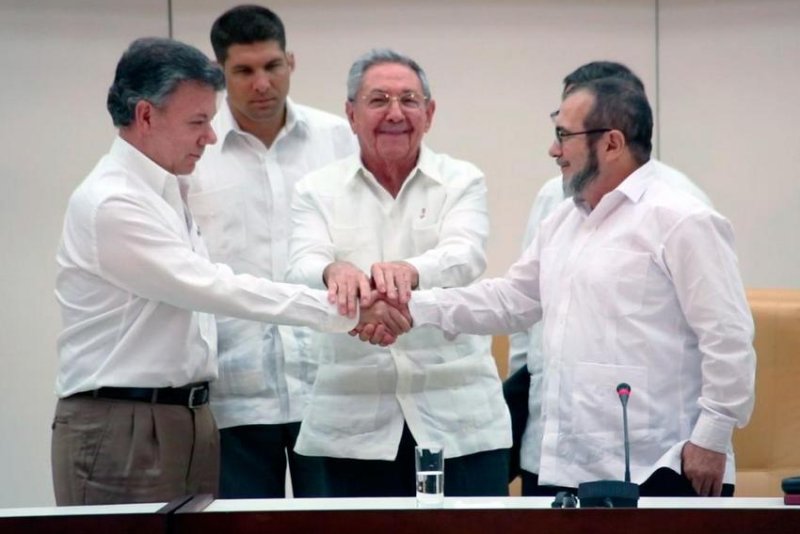The Colombian government, led by President Juan Manuel Santos (L) and the FARC rebels, led by the guerilla group's Rodrigo Londoño (R), have been undergoing intense peace negotiations mediated by Cuban President Raul Castro (C) since 2012 in Havana. The warring sides on Wednesday announced they have agreed to a bilateral ceasefire. Photo courtesy of FARC- EP/Diálogos Paz
HAVANA, June 22 (UPI) -- The Colombian government under President Juan Manuel Santos and the FARC rebel group on Wednesday announced the warring sides have reached a deal on a bilateral cease-fire that could lead to the end of the 52-year conflict.
Peace talks have been taking place between the government and the FARC in Havana, Cuba, since 2012. The sides said they were able to overcome the most contentious aspect of the peace negotiations: the disarmament of the 7,000-strong guerilla group and details over the transition of its members into civilian life. In the early 2000s, about 17,000 militants fought for the FARC.
Santos will travel to Havana on Thursday for a ceremony in which FARC leader Rodrigo Londoño -- also known as Timoleón Jiménez or Timochenko -- will attend.
"Tomorrow will be a great day! We worked for a Colombia at peace, a dream that becomes reality," Santos said Wednesday.
Cuban President Raul Castro, United Nations Secretary-General Ban Ki-Moon, Norway Foreign Minister Borge Brende, Chilean President Michelle Bachelet and Venezuelan President Nicolas Maduro will also attend, as well as representatives from the United States and the European Union.
More than 220,000 people have died and some 5 million have been internally displaced due to the Colombian conflict since the FARC's founding in 1964. The militant rebel group, known officially as the Revolutionary Armed Forces of Colombia, has been involved in drug-trafficking, kidnapping and other illicit activity to fund its insurgency campaign.
Santos recently said he hopes a peace deal will be enacted by July 20, which would end the longest-running conflict in the Western hemisphere. A previous negotiation deadline of March 23 was missed over the issue of disarmament.
"The delegations of the national government and the FARC-EP inform to the public that we have successfully reached an agreement on a bilateral and final ceasefire and cessation of hostilities; decommissioning of weapons; security guarantees and the fight against criminal organizations responsible for homicides and massacres or that target human rights defenders, social movements and political movements, including the criminal organizations that have been labeled successors of paramilitarism and their support networks, and the prosecution of criminal conducts that threaten the implementation of the agreements and the construction of peace," the full joint statement by the government and the FARC reads.
Colombia still faces the threat of the National Liberation Army, or ELN, rebel group. The Colombian government stalled formal peace talks with the guerilla group that were to begin in May over the issue of kidnappings. The ELN is made up of up to 3,000 members but officials estimate the group's numbers are waning.















